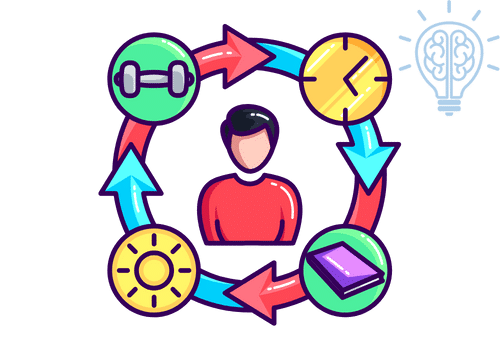What Are Habits?
Habits are behaviors that becomes automatic through repetition. They shape how we think, act, and respond to daily challenges, influencing productivity, well-being, and success.
Some are intentional, such as exercising every morning, while others develop unconsciously, like checking your phone first thing in the morning. Whether positive or negative, they play a major role in shaping long-term behaviors.
Why Habits Matter
Good ones create consistency and efficiency, while bad ones can lead to procrastination, stress, and inefficiency. The key to personal growth is identifying which habits support or hinder success.
Benefits of developing strong ones:
- ✅ Improved Focus: Helps reduce decision fatigue and enhances productivity.
- ✅ Better Time Management: Automates daily tasks, freeing up mental energy.
- ✅ Stronger Self-Discipline: Reinforces positive behaviors through repetition.
- ✅ Increased Motivation: Small wins from consistent habits create momentum.
- ✅ Reduced Stress: Predictable ones add structure and stability to daily life.
How They Form: The Habit Loop
According to research from psychologist James Clear, they form through a three-step process known as the Habit Loop:
🔄 1. Cue (Trigger)
A specific event or stimulus that signals the brain to start a behavior. Example: Waking up triggers the habit of checking your phone.
⚡ 2. Routine (Behavior)
The action itself—the habit being performed. Example: Scrolling through social media.
🏆 3. Reward (Outcome)
The brain receives a reward, reinforcing the habit. Example: A dopamine boost from new notifications.
Repeating this cycle strengthens the neural pathways associated with the habit, making it more automatic over time.
Types of Habits
They fall into different categories depending on their impact and function.
✅ Positive
Support growth and productivity (e.g., exercising, reading, journaling, planning ahead).
⚠️ Negative
Disrupt productivity and well-being (e.g., procrastination, excessive screen time, skipping meals).
🔄 Keystone
Powerful habits that influence other behaviors (e.g., regular exercise improves sleep and eating habits).
🛠️ Foundational
Basic routines that create structure and stability (e.g., morning routines, setting goals, organizing tasks).
How Habits Relate to Executive Function
Habits and executive function skills are deeply connected. Executive functions help establish, track, and maintain habits, while habits support executive function by automating helpful behaviors.
🧠 Executive Functions That Influence Habit Formation:
- Task Initiation: The ability to start new habits consistently.
- Inhibitory Control: Overcoming urges that interfere with positive habits.
- Self-Monitoring: Recognizing which are beneficial or harmful.
- Time Management: Creating structure to maintain habits long-term.
- Working Memory: Remembering and repeating new ones until they become automatic.
Common Challenges in Habit Formation
Building and maintaining habits isn’t always easy. Some common struggles include:
⚠️ 1. Lack of Consistency
Skipping days makes it harder for it stick.
⚠️ 2. Impatience
Expecting instant results can lead to frustration and quitting early.
⚠️ 3. Poor Cue Selection
If a it isn’t linked to a clear trigger, it’s harder to remember to do it.
⚠️ 4. Overcomplicating the Process
Starting with too many new ones at once can lead to burnout.
How to Build Better Habits
To develop strong, lasting habits, consider these strategies:
✅ 1. Start Small
Begin with a micro habit. Example: Instead of “exercise for an hour,” start with “do 10 push-ups.” Small wins build momentum.
✅ 2. Use Habit Stacking
Attach a new one to an existing one. Example: “After I make coffee, I will write down three goals for the day.”
✅ 3. Set Clear Triggers
Make them automatic by linking them to specific cues. Example: “When I get home, I put my phone in a drawer to limit distractions.”
✅ 4. Track Progress
Use a habit tracker, app, or journal to monitor consistency.
✅ 5. Reward Yourself
Celebrate small wins to reinforce positive behavior. Example: “If I complete my habit for a week, I’ll treat myself to a new book.”
✅ 6. Adjust as Needed
Be flexible—modify routines based on changing schedules or new priorities.
How Executive Function Coaching Can Help With Habits
If you struggle with consistency, organization, or breaking bad habits, executive function coaching provides personalized strategies to help build and maintain positive behaviors.
Coaching can help with:
- Developing customized habit-building strategies.
- Improving time management and consistency.
- Strengthening impulse control to resist distractions.
- Creating accountability systems for long-term success.
By mastering the science, you can create positive changes that support both personal and professional growth.
📞 Want to build better habits? Contact us for executive function coaching today!




